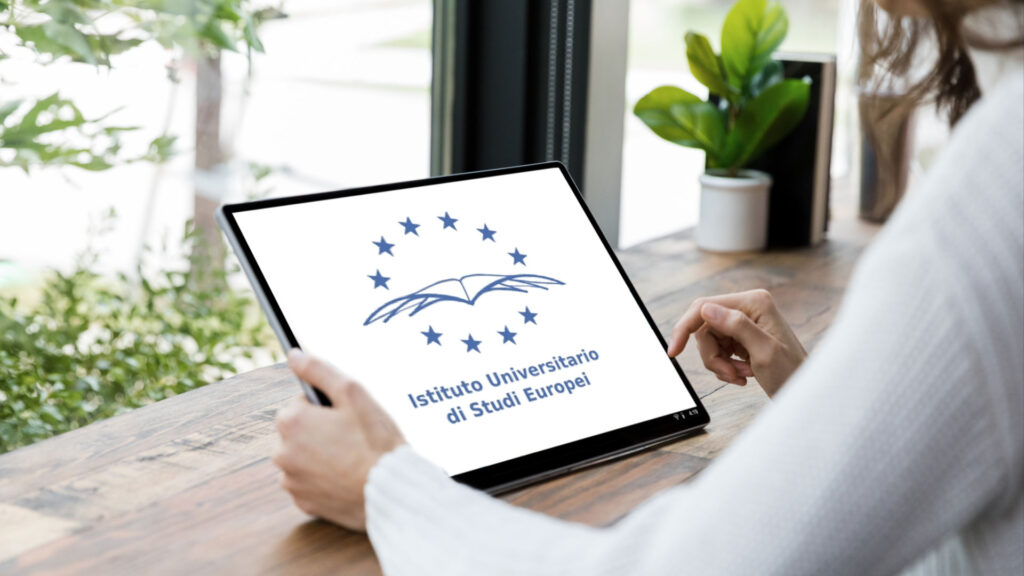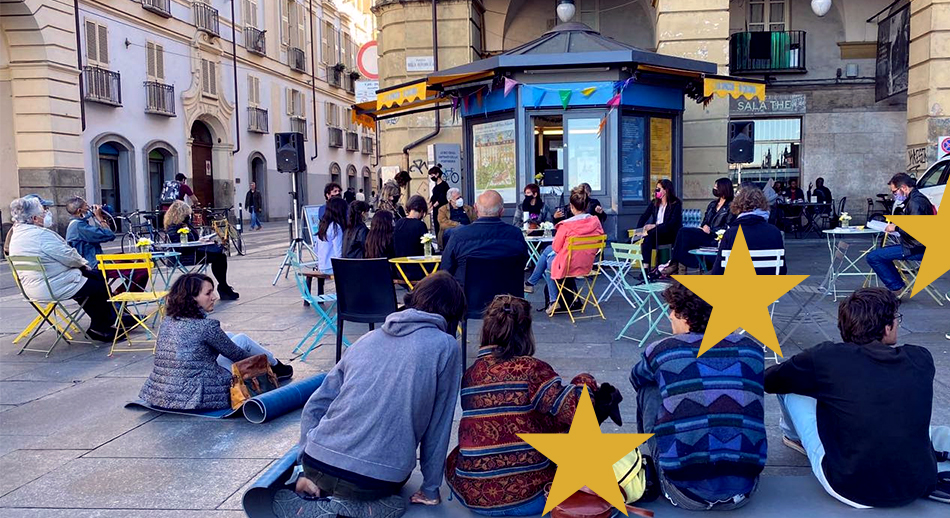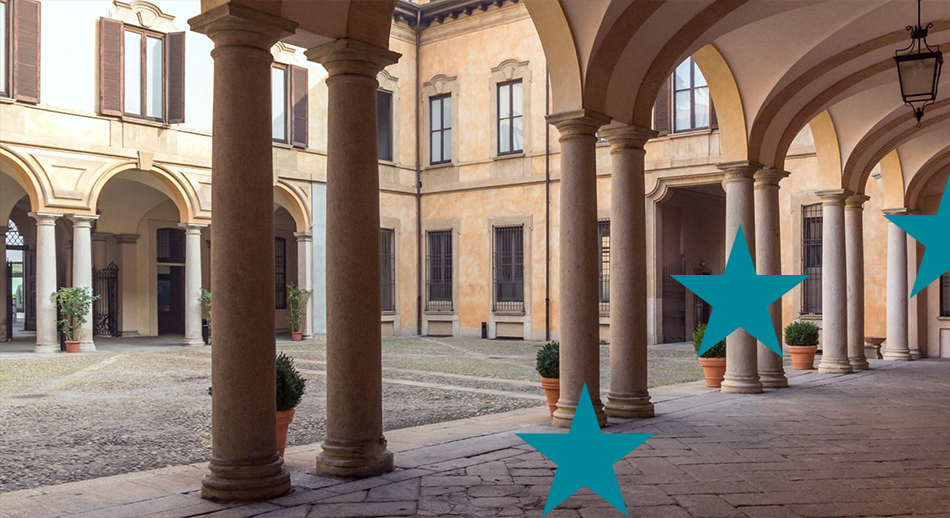We continue our series of posts devoted to introducing actors promoting Europe locally: valuable allies for deepening our knowledge, expanding our network and an excellent source of advice for our business.
Our second post is dedicated to theUniversity Institute for European Studies (IUSE)
The IUSE, a true institution for those concerned with Europe in the Turin, Italian and European scene, is many things at once. It is first and foremost a center of expertise that conducts seminars, courses, research and publications, open to all audiences and aimed at promoting debate and knowledge on European issues. But it is also a European Documentation Center (EDC) officially recognized by the European Commission, a reference point for collecting and consulting all kinds of specialized information related to the EU. It targets a wide audience of students, researchers, institutions and businesses and collaborates with other information centers on the European Union that have been created over the years (such as Europe Direct, Enterprise Europe Network and EURES). It also participates in European projects and is part of numerous networks of organizations active in these issues.
We interviewed Prof. Piercarlo Rossi, president and chief operating officer of IUSE.
What is the European Union for IUSE? In what ways do you feel an active part of it?
The origins of our Institute, well rooted in European Law, tell us that the European Union is a set of common institutions and rules; they tell us that the European Union is a community of interests, which must be reconciled and pursued together.
But the roots themselves also tell us something deeper and more meaningful. The European Union is a shared history, which IUSE has been helping to build since 1952. The European Union is a community of peoples, of people (young people, students, researchers… and others) that over many years our activity has helped bring together, get to know each other and work together.
Union is at the heart of our Institute’s mission to cultivate and grow the opportunities that come with being (precisely) a Union. It is a richness that needs to be understood, studied and explained, through continuous research, education and knowledge dissemination: which is at the core of IUSE’s activity.
What is IUSE’s target audience? What are your local organisations?
IUSE is a European Documentation Center, so our audience is by definition broad: anyone can turn to us for publications, materials, legislative and background papers, and studies related to the European Union and EU institutions. Existing European Union information centers in the local organisations (e.g. Europe Direct) can also approach us for specific analysis and research, documents and insights. We hold, catalog, and make available the documentation they use.
IUSE is also a university institute, so its activities are particularly aimed at university students, researchers and professors: this is a public that benefits from the institute’s academic offerings and at the same time contributes to them, making them grow. But our mission is not only academic. We respond to the needs and requests of businesses, organizations and municipalities in the local organisations, who come to us for support and information, to carry out research, trainings, master’s degrees, summer schools, seminars, events and meeting days. We have always applied a philosophy of maximum openness to the public and maximum access to the most deserving students, thanks in part to contributions from various sponsoring bodies that believe in our mission.
Although IUSE is the point of reference on European issues for Piedmontese universities (Turin and Eastern Piedmont), it does not have a territorial limit of intervention. Our courses and activities are open to everyone, regardless of background. We are part of international networks that lead us to provide knowledge and support in many geographical areas, not only in Europe. Our alumni work in organizations, companies and institutions around the world, which thus develop a privileged relationship with IUSE and contribute to our work through collaboration agreements and joint projects.
In what ways do you provide support? What tools and answers are you able to provide?
Our mission has been the same since 1952, but the optics have changed over time. We were born many years ago to support Italy’s European project: through our research, documentation and training work, we have supported Italian institutions, entities and organizations in their entry into Europe, their participation in European affairs and their legal and regulatory approximation to the common rules of the European community.
Over time, the optics of this mission have adapted to the needs, moving closer to the citizens. Today’s mission is broader and perhaps more difficult: in addition to bringing Italy to Europe, it is especially necessary to bring Europe to Italy. That is, to bring Europe closer to young people, students and all cultural, institutional and professional organizations in our local organisations. As in 1952, we provide the academic, educational and documentary basis for a new, important phase of European construction.
We do this through an ever-evolving set of tools: we organize courses, master’s degrees and business schools; we collect, catalog and make available documentation (legislative, academic and of general interest) regarding European issues; we provide support to all entities and individuals who request it; we facilitate and organize exchange opportunities between universities, institutions and businesses; we promote and participate in international and local organisations on European issues; and we organise “matchmaking” initiatives between professionals, students, scholars, organisations and businesses interested in Europe.
At a time when information is widely available online (e.g., through the websites of European institutions or through the EurLex platform), our Library and Archives provide a depth of analysis that does not exist elsewhere: both historically (with thousands of documents and publications catalogued since 1952) and in terms of content (specialized books, internal documents of European institutions and academic publications have a far greater technical depth than most of the material available online). In addition, the documentation we offer is organized, cataloged, and easy to use with the assistance of our dedicated staff.
Our training courses on European issues are among the most highly regarded and recognized by practitioners. For example, IUSE is one of the few authorized and recognized centers for the preparation of competitions for EU institutions (so-called EPSO competitions), as well as the only one in northern Italy.
We are one of the institutions that has been offering quality courses on EU projects and funding issues for the longest time (a piece of information that is sure to be of interest to your readers!): courses that include a well-established basic level, in-depth coverage of practical aspects, and a specific focus on theuse of English in writing EU projects.
Our research activity on European issues is of a high level and we actively participate in European projects: for example, we are the Italian Hub of the EuropeanLaw Institute (ELI), which accompanies the evolution, quality and understanding of European law and was born as a spin-off of a European project(Joint Network on European Private Law) of which IUSE was part.
What does IUSE recommend to an organization or person wishing to participate in a European project?
Advice can be many, but I would single out two above all.
First, focus carefully on the motives and interests of those funding the project (European Commission or the contracted Managing Authority in charge): what is the added value of the project we are proposing compared to its objectives? How does the project contribute to the social challenges that European (and/or national and local) institutions aim to address?
And in particular, to further detail this point, these challenges (somewhat “picked up” by the project we propose):
- Have they really been identified as a priority (relevance)?
- Are they actually addressed and (partially) resolved by the project (consistency and effectiveness)?
- What skills, experience, and approaches are they based on-that is, are our proposed methodology and know-how really the ones that can “make a difference” (efficiency)?
- Are they addressed in such a way as to change the situation in the desired direction in a concrete, demonstrable, and lasting way (impact and sustainability)?
By answering these questions (also taken from your guide), project proponents are able to optimally identify, address and present both the social challenge they intend to solve and the proposed action; choosing the most appropriate level of intervention and type of call.
A second piece of advice concerns the specific dimension from impact, which is increasingly receiving attention and interest from institutions, evaluators and organizations active in Europe. The impact should be considered from two different perspectives. First, on a global level: that is, echoing what has already been said, it concerns the ability to identify (and demonstrate) concrete and real changes produced on a social problem of interest through our design intervention. But it also has a finer, equally important dimension: that is, is my project (or to get into the concrete, my budget, my identification of partners and resources, the simple chronological order in which I organize my interventions, the type of solutions proposed; etc.) structured in a way that is appropriate to really achieve the changes it aims for? Sometimes all it takes is the forgetting of a detail to break the chain that, from my project idea, should lead me to the expected impact.
Appropriate consideration of impact (understood as the “pervasive” dimension of the entire project) leads to a much more convincing, much more effective design with a greater chance of success. This is a type of topic we believe in very strongly and would like to devote some of our Institute’s future activities to it.
Can you tell us about a particularly significant IUSE support experience?
The experiences we can recount are many-and especially very diverse, given the breadth of IUSE’s mission and the variety of interventions it offers.
We have already mentioned the ELI project. In addition, IUSE often participates in study initiatives funded by the European Commission, as was the focus on collective redress in 2012 together with the British Institute of International and Comparative Law that later led the European Commission to propose legislation on the subject. A significant example of impact and sustainability, to pick up on the theme we just addressed.
Our courses and training activities are another very significant and “impactful” component of the support we provide: from our homepage you can appreciate the variety of training offerings, both as types of courses (masters, postgraduate courses, executive courses, online courses, lectures, seminars… in addition to the existence of our own agency specifically dedicated to training, IUSEFOR) and as the breadth of topics (legal aspects of international trade, EU projects and funding, aspects of European law for administrators and officials, specialized use of English, programming and control, budgeting and reporting, social planning… and more). This allows us to build a network of relationships and Alumni who carry on IUSE’s mission in the world and in their work – and who often return to IUSE with new proposals and initiatives.
But it is also important to talk about our contribution to specific projects, such as POREEN (Partnering Opportunities between Europe and China in the Renewable Energies and Environmental iNdustries), the design and implementation of which IUSE was actively involved in. The development of renewable energy is undoubtedly one of the key social challenges of our time, as is the need to address these challenges in partnership with major global players, such as China. The project enabled all of this in terms of impact, but it was equally important for IUSE itself. In fact, a key aspect of European projects is often overlooked: the very act of implementing them (or even just preparing them) contributes to the creation of unique skills within organizations. Participation in a European project, even when unsuccessful, is a formidable tool for growing human capital: in terms of soft skills (writing, budgeting, networking), technical skills (deepening best practices and broadening vision to other areas), and a wealth of human and professional relationships.
It is meant to be an encouragement to those who are approaching the world of europlanning with some trepidation: know that in the worst case scenario, you will learn a lot, you will absorb new ideas, you will improve in what you are already doing, and a world of new relationships and opportunities will open up to you.




